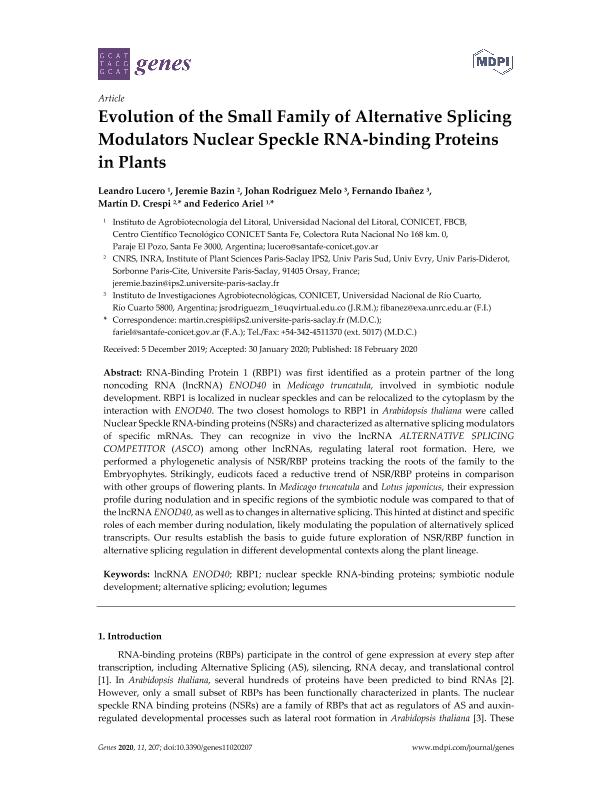Artículo
Evolution of the small family of alternative splicing modulators nuclear speckle RNA-binding proteins in plants
Lucero, Leandro Exequiel ; Bazin, Jeremie; Rodriguez Melo, Johan Stiben
; Bazin, Jeremie; Rodriguez Melo, Johan Stiben ; Ibañez, Fernando Julio
; Ibañez, Fernando Julio ; Crespi, Leandro Martín; Ariel, Federico Damian
; Crespi, Leandro Martín; Ariel, Federico Damian
 ; Bazin, Jeremie; Rodriguez Melo, Johan Stiben
; Bazin, Jeremie; Rodriguez Melo, Johan Stiben ; Ibañez, Fernando Julio
; Ibañez, Fernando Julio ; Crespi, Leandro Martín; Ariel, Federico Damian
; Crespi, Leandro Martín; Ariel, Federico Damian
Fecha de publicación:
02/2020
Editorial:
Molecular Diversity Preservation International
Revista:
Genes
ISSN:
2073-4425
Idioma:
Inglés
Tipo de recurso:
Artículo publicado
Clasificación temática:
Resumen
RNA-Binding Protein 1 (RBP1) was first identified as a protein partner of the long noncoding RNA (lncRNA) ENOD40 in Medicago truncatula, involved in symbiotic nodule development. RBP1 is localized in nuclear speckles and can be relocalized to the cytoplasm by the interaction with ENOD40. The two closest homologs to RBP1 in Arabidopsis thaliana were called Nuclear Speckle RNA-binding proteins (NSRs) and characterized as alternative splicing modulators of specific mRNAs. They can recognize in vivo the lncRNA ALTERNATIVE SPLICING COMPETITOR (ASCO) among other lncRNAs, regulating lateral root formation. Here, we performed a phylogenetic analysis of NSR/RBP proteins tracking the roots of the family to the Embryophytes. Strikingly, eudicots faced a reductive trend of NSR/RBP proteins in comparison with other groups of flowering plants. In Medicago truncatula and Lotus japonicus, their expression profile during nodulation and in specific regions of the symbiotic nodule was compared to that of the lncRNA ENOD40, as well as to changes in alternative splicing. This hinted at distinct and specific roles of each member during nodulation, likely modulating the population of alternatively spliced transcripts. Our results establish the basis to guide future exploration of NSR/RBP function in alternative splicing regulation in different developmental contexts along the plant lineage.
Archivos asociados
Licencia
Identificadores
Colecciones
Articulos (INIAB)
Articulos de INSTITUTO DE INVESTIGACIONES AGROBIOTECNOLOGICAS
Articulos de INSTITUTO DE INVESTIGACIONES AGROBIOTECNOLOGICAS
Articulos(IAL)
Articulos de INSTITUTO DE AGROBIOTECNOLOGIA DEL LITORAL
Articulos de INSTITUTO DE AGROBIOTECNOLOGIA DEL LITORAL
Citación
Lucero, Leandro Exequiel; Bazin, Jeremie; Rodriguez Melo, Johan Stiben; Ibañez, Fernando Julio; Crespi, Leandro Martín; et al.; Evolution of the small family of alternative splicing modulators nuclear speckle RNA-binding proteins in plants; Molecular Diversity Preservation International; Genes; 11; 2; 2-2020; 1-13
Compartir
Altmétricas



